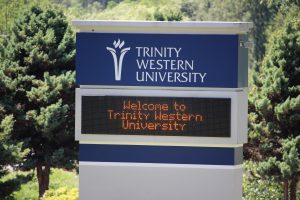
Sign on TWU Campus
I detected a general theme in the respective Court of Appeal arguments of the Law Societies in British Columbia and Ontario over the last two weeks. “We are the experts. We know what we are doing. Now give us deference. Our decisions against accrediting Trinity Western University’s School of Law are reasonable.”
The final hearing of the TWU controversy was held June 7 before the Ontario Court of Appeal in historic Osgoode Hall, Toronto. There TWU lawyer Robert Staley faced the Law Society of Upper Canada’s lawyer Guy Pratte. It was fiercely contested. Each eloquently put forward their clients’ position.
TWU argued that the LSUC did not correctly apply the proper legal test in its decision making process, thus eviscerating its religious freedom. To understand the argument you first need to understand how the courts analyze Charter rights.
The Charter protects citizens from the state. It is the supreme law of the land.
The “state” can be government officials, politicians, legislatures, police, or bodies that have been delegated authority by the state such as law societies. Law societies are known in this context as “state actors” – they are created and authorized by the provinces to protect “the public interest” in the practice of law. They regulate who can be lawyers, establish the professional ethic codes, set the ongoing education requirements, and discipline lawyers as necessary. Professions, such as law, covet such roles. From one perspective it is highly irregular to have the public interest of an influential profession being safeguarded by the profession itself. On the surface it looks like a systemic conflict of interest. However, there are measures to soften that by including members of the public on the Society’s governing council, known as “the Benchers”. Nevertheless, it is extremely important that these “state actors” are mindful of the law and of the competing interests in the cases they have to decide.
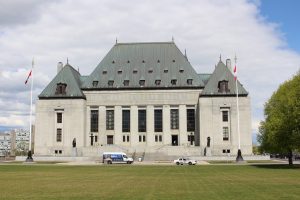
Supreme Court of Canada
The Supreme Court of Canada (SCC) laid down the rules as to how administrative bodies, such as law societies, are to decide cases that involve constitutional rights. The law is laid out in the 2012 case known as “Doré v. Barreau du Québec”. Doré teaches us that when a law society is faced with a decision that involves claims of Charter rights it must follow a particular formula or “test” in its analysis. If it does this it will be considered a “reasonable” decision even though it could have arrived at a different conclusion using the same test. In other words, the Court is saying, the law society is the expert panel to decide issues that come within its jurisdiction and must be given deference in its decisions. It may not be the way a court would decide but it is within the realm of “reasonableness.”
The Doré test that applies to administrative tribunals operating under a statute then is this: What are the statutory objectives? Is there a Charter right or value engaged? How will the Charter value at issue be best protected in light of the objective? In other words, what would be the least onerous and least restrictive infringement on the constitutional right or value while carrying out the statutory objective in the case?
The Law Society arguments made in Ontario and British Columbia have centred on the Doré test. They maintain that the statutory objectives include the “public interest” of ensuring that there is equal access to the profession for all people. It is here where TWU fails they say.
TWU has a Community Covenant, a contractual arrangement, between the University and its students, wherein each student agrees to abide by its terms and conditions. It’s a basic arrangement not unlike numerous other Christian universities in North America that establish the religious nature of the campus environment. One of the requirements is that the students not engage in sexual activity outside of the traditional marriage (one man, one woman).
The law societies argue that TWU can maintain its religious campus. That is TWU’s constitutionally protected religious freedom to do so. But when TWU comes to a public body for state recognition of its degree then it must abide by the public norms. The refusal to accept LGBT students who do not accept the Community Covenant is discriminatory. As a result the law societies cannot accredit the TWU School of Law.
TWU lawyers in Ontario (Robert Staley) and British Columbia (Kevin Boonstra) argue the law societies did not apply the Doré test in reaching their conclusions.
Ontario Court of Appeal
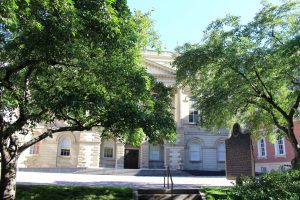
Osgoode Hall – Ontario Court of Appeal – TWU hearing was in Court Room 1
At the Ontario Court of Appeal, Robert Staley went through the transcript of the Benchers as they made their decision. “Not a single Bencher followed the Doré analysis,” Staley informed the Ontario Court of Appeal. Instead the Benchers spoke in absolutist terms that the rights of the LGBT community must not give way.
When asked by the Justices about the references the Benchers made about “balancing” the rights of religious freedom and equality rights, Mr. Staley noted that the Benchers’ use of the “buzz words” did not in and of itself mean they applied the proper Doré analysis. What they did, Staley maintained, was to use part one of the Doré test – that is they recognized that they were to exercise their duty to maintain the public interest by ensuring equality of access to the practice of law.
However, even here, Staley argued, the Benchers failed because there was no public interest engaged. The only public interest was that of ensuring that TWU graduates were competent to practice law, which the Society has agreed they would be. Further, the recognition of TWU’s law school did not take away any right of the LGBT community. Recognition of one right does not mean a diminution of the rights of others.
Even if they could say that there was a public interest engaged, then the Benchers should have applied the second part of the Doré test which was: what would be the least onerous and least restrictive infringement on TWU’s religious freedom while carrying out the statutory objective of ensuring equality of access?
The Benchers did not bother. They refused to even consider accommodation.
In essence, I take Staley’s argument to be, that the Benchers were so opposed to the teachings of TWU that they were blinded by their distaste of the belief of traditional marriage that was manifested in the Community Covenant. That blind opposition meant they did not even entertain the thought of how they were to find a way of accommodating TWU’s religious freedom. It was simply rejected. There was no possibility as far as they were concerned. It was repugnant, plain and simple, and did not need further consideration.
Staley argued that the Divisional Court’s decision provided a Doré analysis of how the Benchers could have arrived at its decision. But it is not the role of the courts to do the work of the administrative tribunals. The tribunal, in this case the Law Society, is to be the expert and given deference. However, the Law Society does not to get “a free ride” since fundamental religious freedom is at stake.
Guy Pratte, the lawyer representing the Law Society, argued that the Society’s decision was reasonable as the Divisional Court showed. For 200 years the Society has played the role of the gatekeeper to the profession and over time it has sought to remove barriers rather than raising barriers. To support TWU’s law school would be to endorse TWU’s discrimination. Admission to a law school should be based on merit, not on religion.
Mr. Pratte asserted that the religious freedom TWU wants to advance goes further than keeping its own faith. It seeks to enforce it on others who are “not part of the club.” However, when they enter the public sphere and enter into a public profession they have to lay their beliefs aside. Denying applicants on grounds of sexual orientation has nothing to do with the merits of being a lawyer. They cannot force the Law Society to approve that.
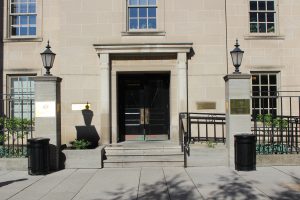
Entrance to the Law Society of Upper Canada
If the Law Society breached the freedom of religion in its decision making process because it did not follow some “magic words” it does not matter. TWU’s position that the Doré analysis was not followed is an argument of “form over substance.” What matters is the outcome. And the outcome was a reasonable decision. Since the Divisional Court used Doré and arrived at the same conclusion then how can the Law Society’s decision be unreasonable? It is not unreasonable for the Law Society to say that religious freedom does not go so far as to force your beliefs on another. The Law Society was asked a “binary” question – it was a simple “yes” or “no.” After seriously considering the issues the Law Society said “no”. The Law Society could have said “yes” and if it did – that too would have been reasonable. TWU does not “get to have everything.”
When the court pointed out that TWU did not get anything. Mr. Pratte noted that there is only one part of the Community Covenant that is at issue. The Society would have no problem with the Covenant if it were not made mandatory of TWU students. It is concerned with the exclusion of students at the “door”. Religious conduct is worthy of less protection than beliefs. Though there are only a few from the LGBT community who would want to attend TWU, the state doesn’t take the sting out of the discrimination by closing its eyes or holding its nose because of the few.
In reply Mr. Staley reminded the court that the Doré analysis is not simply a magic formula but a very clear direction from the Supreme Court as to the proper analysis that is to be applied that ensures Charter rights are respected. There was absolutely no evidence that the Law Society considered what was the least infringement on TWU’s rights.
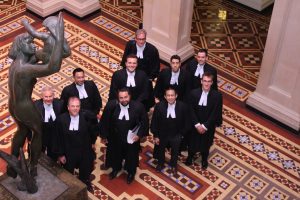
Lawyers representing TWU and supporting interveners at Ontario Court of Appeal
British Columbia Court of Appeal
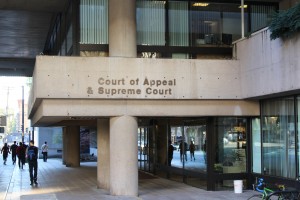
Entrance to the British Columbia Court of Appeal
The TWU case in BC is different from Ontario in that the Law Society of British Columbia (LSBC) had first voted to accredit TWU’s law school but then decided to change its mind.
The LSBC was faced with what it thought was a no win situation. When the Federation of the Law Societies of Canada approved the school, BC lawyers in opposition to TWU called on the LSBC to disapprove the Federation’s decision. After much debate and discussion about the competing rights of religious freedom and equality issues the LSBC decided, in April 2014, not to overturn the Federation.
However, the opposition got louder and demanded a Special General Meeting in June to discuss a resolution demanding the LSBC to overturn its support of TWU. That meeting was held in several locations simultaneously throughout BC. Those who attended reported to me that there was tremendous animosity expressed towards TWU for having the audacity to ask that its religious rights be respected. It was a classic case of a crowd being ticked off at the minority that stands its ground on matters of conscience. The vote at the SGM was overwhelming against TWU.
In an attempt to overcome the impasse the LSBC decided, in September, to hold a referendum of the entire membership rather than to have another extensive debate as it did in its April meeting. Not surprisingly, the referendum results were against TWU. Upon judicial review, Chief Justice Hinkson ruled that the LSBC had illegally fettered its discretion by turning over its decision making jurisdiction to the membership rather than having a full consideration of the issues as it did in its April decision. He then ordered the reinstatement of the April decision thereby approving TWU School of Law. The LSBC appealed.
At the Court of Appeal, LSBC lawyer, Peter Gall argued that there were three issues to consider. First, whether the LSBC had the jurisdiction to approve or disapprove TWU. Second, how to reconcile the competing rights in light of LSBC’s statutory obligations. Third, whether using the means of a referendum was an appropriate process.
Gall explained that the law society was in a no win situation. It was going to be faced with opposition whether it approved TWU or not. CJ Hinkson’s decision said that the LSBC didn’t balance the rights and more should have been done. But what more could have been done or could it do now, Gall asked?
The court noted that the LSBC had given its jurisdiction over to the members of the entire law society to make the decision involving Charter rights. To which Gall responded it is difficult and it depends upon the “lens” you use to look at the right from either the perspective of religious freedom or equality rights – there is a reasonable answer both ways and therefore it was reasonable for the LSBC to allow the members to decide the matter. The LSBC still could override the members if what they decided was unreasonable. In this case their decision not to approve TWU was reasonable.
The court had a rough time with this line of argument. One justice asked, “So the entire members are able to conduct a Doré analysis?” Another asked if at the point the members were engaged in making the decision were they then all “Benchers” under the enabling legislation of the LSBC? Mr. Gall continued with his line of reasoning that the Benchers were able to ascertain whether all of the rights were being properly assessed to ensure the final result was reasonable.
Still the court struggled with the idea that the entire body of lawyers could be granted such decision making power. The court asked to whom it gives deference to – the LSBC Benchers or the members?
Chief Justice Bauman said, in what appeared to be a look of wonder, “That would make the Law Society the largest tribunal in B.C.” There are over 10,000 lawyers in BC.
“Potentially, yes.” Replied Gall. The court was wanting to be clear and asked whether that would also mean the LSBC could give matters of discipline of lawyers over to the complete membership?
“Yes,” came the reply. They could by SGM resolution take up matters of discipline. If it is an important issue for members as a whole to decide, the LSBC could delegate it to the members.
Mr. Gall went into an extensive discussion about the objectives of TWU and argued that to change the Community Covenant so that it is not mandatory would not affect those objectives. Such a compromise would not prevent teaching from an Evangelical perspective. TWU welcomes students who are not evangelical to attend and that does not impact the associational rights so why is it necessary to have a covenant dealing with sexual intimacy?
The court asked if the LSBC was challenging the “bona fides” or validity of the rule of faith of the religious people at TWU.
“No,” replied Mr. Gall. He went on to explain that the question is whether there is a proportionate result from a proper balancing of the beliefs and practices of TWU against the equality considerations of the LGBT community. Emphasis should be given to the determination of the impact on TWU’s beliefs and the objectives of the law school.
The court noted that it is not for the court to say whether the belief is important to TWU or to intrude on those beliefs. Mr. Gall agreed but he explained that the court does have to determine the extent of the harm if insignificant or trivial. Mr. Gall observed that it is not easy to weigh but one has to look at the impact of what the LSBC statutory mandate is on the Charter right. The balancing must be made with the LGBT community losing out on 60 law school spaces and the psychological harm of seeing the state approve and in so doing, condone a discriminatory school of law. Such an endorsement would harm the public interest of protecting the administration of justice.
The Benchers’ October decision not to approve on basis of the memberships view was consistent with the statutory mandate and its constitutional obligations. It was a proportionate balance of the competing rights. The question on review is whether that decision of the Benchers was reasonable. To determine reasonableness the court must look at the impact of the competing rights. When you consider the stated objectives of TWU to have a law school what is the impact of removing from the Community Covenant the offending provision?
Kevin Boonstra, TWU’s counsel, argued that the court has to consider the contexts – the statutory context and the factual context. The statutory context requires the court to determine whether the Benchers had the authority to determine admissions policies of a law school. The statute gave the LSBC authority over qualifications to practice law and not the determination over how law schools are run. The factual context discloses two opposite decisions of April and October.
Mr. Boonstra noted that there can only be one correct decision that is consistent with the public interest. The Doré analysis requires that the impact on a Charter right must be infringed only as what is absolutely necessary to carry out the public interest. If in April that meant that TWU’s school of law was approved, what made the difference to that calculation in October? Why could the LSBC no longer accommodate TWU’s interest? Why was it necessary to remove the right altogether in October?
TWU serves the needs of the Evangelical community. They believe in moral boundaries. There is no distinction between what one believes and how one lives one’s life. You cannot pick and choose which boundaries are important and which are not.
TWU’s mission is to educate the whole person – called spiritual formation. There are codes of conduct in other evangelical organizations. The Federation looked at the rules of US Christian law schools and found that it would not be an impediment to practice law in Canada. American students from those schools would be able to practice here. TWU is not availed this right in Canada. [But it is interesting to note that if TWU were in the US, its students would be able to practice in Canada through the current rules of the Federation.]
In its April meeting the LSBC undertook a full public review. Two legal opinions were obtained that supported TWU’s position. All of the issues of accommodation and balancing of rights were reviewed. In the end the Benchers voted in support of TWU.
The court asked how it could be fair to allow the April decision to stand when it was clear that the LSBC wanted to change its position.
Mr. Boonstra noted that the LSBC was motivated by political and governance pressure within its ranks. In October there was no balancing considered. It was simply what the members wanted. Only a proportionate balancing underlying a decision makes it a reasonable decision as noted in Doré where rights are limited only to the extent necessary to maintain the legislative objectives. It was the duty of the Benchers to conduct this analysis not the members. The transcripts clearly show that October was a political decision and not a substantive review.
Mr. Boonstra also noted that the 2001 Case that involved TWU’s education program was a binding precedent in this matter. The BC College of Teachers argued that they could not condone the discriminatory admissions policy of TWU. The Supreme Court of Canada ruled that TWU was not for everyone. Boonstra went on to note that since 2001 the protections of religious freedom have increased in SCC decisions including the right of religious communal rights in the Loyola decision of 2015.
In reply Mr. Gall stressed the importance of the court to give deference to LSBC and though the process in October may not have been in accordance with the Doré analysis, at the end of the day it is whether the decision was right.
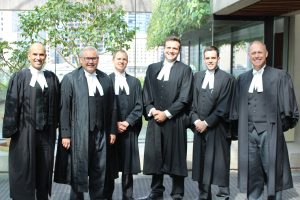
Lawyers representing interveners supporting TWU at the BC Court of Appeal
Concluding remarks and observations
With the Courts of Appeal in British Columbia and Ontario having held their hearings we are now at the end of this phase of the TWU saga. Over the coming months we wait for the decisions from three Courts. Nova Scotia’s can be expected anytime in the coming weeks. I do not expect to hear from Ontario or BC until the fall. Whatever the results, we can expect that this case will be heard at the Supreme Court of Canada.
It remains baffling that TWU would have to put forward so much money, energy and effort to defend its right to open a law school. One only has to consider that TWU is not subject to the Charter. In other words, it is not a state actor that it has to open its doors to whoever applies. There are never any requirements for religious institutions to be other than who they are. By definition religious communities discriminate. They have to. In fact, the human rights laws and the Constitution provides the space for this. That is what the Supreme Court in 2001 explicitly stated about TWU. TWU’s “discrimination” is lawful. It is how it works. How can you have a church where anyone can be a minister of that church even if they do not hold to the church’s beliefs? How can it be said that a university remains a religious university if it cannot hire faculty and accepts students who are willing to abide by its religious principles? It simply makes no sense.
The millions of dollars that have been spent in defending TWU’s right to have a Code of Conduct that supports its religious beliefs on marriage is beyond comprehension. It seems there is a growing opinion among some legal elites in Canada that has moved beyond the judiciary. This is evident in Nova Scotia and British Columbia where the lower courts supported TWU’s position. While the Ontario Divisional Court’s decision is the outlier so far it is also a direct challenge to the Supreme Court’s 2001 decision which said that “TWU is not for everybody.” For the Ontario Divisional Court it would appear that TWU’s law school is not for Ontario.
From my attendance at every court of appeal hearing in this case I sense that there is a great deal of sympathy for TWU’s position. At the very least, the justices appear to understand TWU’s position. It seems to me that there is a lot of work to do in informing the public, the opinion makers, and policy makers about the importance of this case. In my opinion, this is the most important religious freedom case in recent Canadian history. The implications of a loss in this matter is huge. Where, for example, will the logic end if TWU loses? If the law societies can deny TWU, what about all the other professional organizations? Would there be a movement to move against other religious colleges and universities in other disciplines? I think that is exactly where we are headed.
One of the interveners, LGBTQ Coalition, argued that if the LSBC had approved TWU it would be an “endorsement of an unconstitutional definition of marriage.” An unconstitutional definition of marriage? That is a remarkable statement. It is a very good thing that the Supreme Court of Canada in 2004 decided that clergy who performed only such “unconstitutional” marriages of one man and one woman would be protected. Further, the SCC also said in 2004 that churches could exclusively use its facilities for “unconstitutional” marriages of one man and one woman. Without those very minimum protections there is no question, in my mind, that there would be demands for the use of all churches for whatever “constitutional” marriages people would want.
I have said it many times before but this case is about trying to find a way for various communities, with very different views on basic moral issues, to be able to live on the same piece of real estate in civil peace. A failure to allow TWU to have a law school because of its religious views and communal practices – practices that are constitutionally protected – is a step back from the promise of Canada that we have all enjoyed. The Supreme Court of Canada noted in the 2001 TWU decision:
Indeed, if TWU’s Community Standards could be sufficient in themselves to justify denying accreditation, it is difficult to see how the same logic would not result in the denial of accreditation to members of a particular church. The diversity of Canadian society is partly reflected in the multiple religious organizations that mark the societal landscape and this diversity of views should be respected. (Paragraph 33.)
The denial of TWU’s school of law would mean that we can expect our individual church membership may be cause for denial of state issued licenses. That would not be a recipe for a diverse Canada. In other words, we are fast approaching a time where there will be significant pressure against a diversity of communities and religious views. Monochromatic hegemony is approaching.
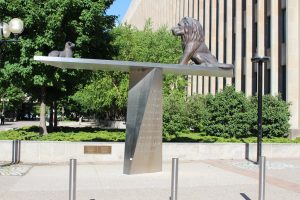
Equality Before the Law – the lion and the lamb outside of the Ontario Courts in Toronto


Thank you Barry for your summation of this legal case. In a free and democratic society, a diversity of views are to be respected and protected in Canada.
Scripture is playing out just as it is written…. It is amazing that there is so little tolerance for followers of Jesus than for any other “religious” group…
Thanks for the comprehensive review.